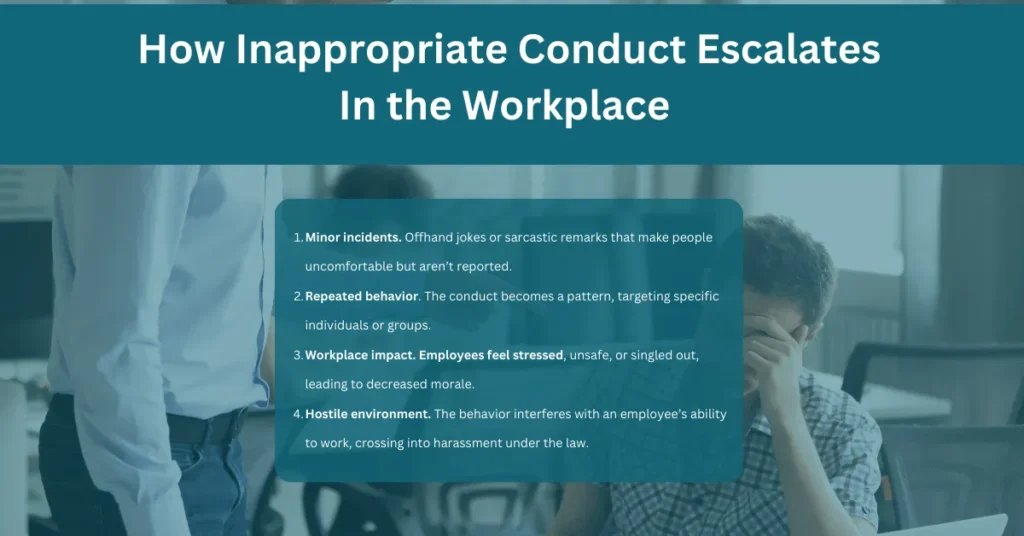Many employees brush off offensive jokes, rude remarks, or uncomfortable situations at work as “just part of the job.” But when those behaviors continue, they often escalate into something more serious creating a toxic workplace culture that can harm both employees and employers.
This kind of behavior falls under the broad category of inappropriate conduct.While not every rude comment is illegal, certain types of inappropriate conduct can cross the line into harassment or discrimination. When this happens, employees have rights under Oregon and federal law.
If you’re dealing with a hostile work environment, know that you don’t have to face it alone. AnOregon employment lawyercan help you understand your rights, document your experiences, and take action to protect your career and well-being.
TL;DR
Inappropriate conduct in the workplace can escalate into harassment and create a hostile environment. Oregon law protects employees from discrimination, harassment, and retaliation. If your employer ignores your complaints, document incidents, report them, and seek help from an employment lawyer.
Defining Inappropriate Conduct in the Workplace
“Inappropriate conduct” is a broad term. It can range from mild unprofessionalism to outright unlawful behavior. Employers often use the phrase in workplace policies, but the meaning depends on the context.
Examples of unprofessional but not necessarily illegal behavior include:
- Repeated lateness or absenteeism.
- Rudeness toward coworkers or customers.
- Poor hygiene or failure to follow dress code.
- Insubordination or refusal to follow company policy.
Examples of conduct that could violate the law include:
- Sexual harassment or unwanted physical contact.
- Discriminatory comments about race, gender, religion, disability, or age.
- Intimidation or threats.
- Retaliating against employees who report concerns.
While the first category may be addressed by HR or company policies, the second can create legal liability for employers.

How Inappropriate Conduct Escalates
What starts as a small issue often grows into something much larger when left unchecked. Consider the following progression:
- Minor incidents.Offhand jokes or sarcastic remarks that make people uncomfortable but aren’t reported.
- Repeated behavior.The conduct becomes a pattern, targeting specific individuals or groups.
- Workplace impact.Employees feel stressed, unsafe, or singled out, leading to decreased morale.
- Hostile environment.The behavior interferes with an employee’s ability to work, crossing into harassment under the law.
The danger of ignoring inappropriate conduct is that it normalizes the behavior, allowing it to escalate. Employers that fail to address early warning signs may later face legal claims for harassment or hostile work environments.
The Legal Side: When Inappropriate Conduct Becomes Harassment
Under both federal lawand Oregon law,certain behaviors are unlawful when they create a hostile work environment.
Protected categories under the law include:
- Race, color, and national origin.
- Sex, sexual orientation, gender identity, and pregnancy.
- Age (40+).
- Disability and medical conditions.
- Religion.
- Marital or veteran status (protected under Oregon law).
Harassment occurs when inappropriate conduct is severe or pervasiveenough to interfere with an employee’s work or create an intimidating, hostile, or offensive environment. This can be verbal (slurs, jokes), physical (unwanted contact), or visual (offensive materials).
Employers can be held liable if they know about the conduct and fail to stop it.

Employer Responsibilities in Preventing Inappropriate Conduct
Oregon law requires employers to provide safe and respectful workplaces. This duty means more than simply having a handbook — it requires active prevention and response.
Employers must:
- Implement clear policiesthat prohibit harassment and inappropriate conduct.
- Provide trainingso employees and managers know what behavior is unacceptable.
- Investigate complaints promptlyand thoroughly.
- Take corrective actionagainst employees who violate policies.
- Prevent retaliation,ensuring that employees who speak up are not punished.
Failing to take these steps not only harms employees but also exposes the business to lawsuits, financial penalties, and reputational damage.
Employee Options if Facing Inappropriate Conduct
If you’re experiencing inappropriate conduct at work, you do have options. Here are the steps most employment attorneys recommend:
- Document incidents.Write down dates, times, locations, what was said or done, and who witnessed it. Save emails, text messages, or other evidence.
- Review workplace policies.Your employee handbook may outline reporting procedures.
- Report internally.File a complaint with HR, a supervisor, or a company hotline.
- Escalate externally.If your employer fails to act, you can file a complaint with the Bureau of Labor and Industries (BOLI) or the Equal Employment Opportunity Commission (EEOC).
- Consult a lawyer.An Oregon employment lawyer can help you evaluate your case, ensure deadlines are met, and protect you from retaliation.
Taking action may feel intimidating, but documenting and reporting conduct is critical to protecting yourself and holding employers accountable.
Consequences of Ignoring Inappropriate Conduct
Both employees and employers suffer when inappropriate conduct is ignored.
For employees:
- Increased stress, anxiety, or depression.
- Difficulty focusing and reduced job satisfaction.
- Career setbacks if they feel forced to quit.
For employers:
- Potential lawsuits for harassment, discrimination, or retaliation.
- Financial penalties, including back pay and damages.
- High turnover and difficulty retaining talent.
- Reputational harm that affects customer trust and recruiting.
Some Oregon companies have faced costly settlements because they failed to address inappropriate conduct, showing how serious the consequences can be.
Why Legal Guidance Matters
It’s not always easy to tell when inappropriate conduct is simply a policy issue versus a legal violation. Employers often downplay complaints or argue that behavior was “just joking around.”
An employment lawyer can:
- Assess whether the conduct meets the legal definition of harassment or retaliation.
- Guide you through filing complaints with BOLI or EEOC.
- Help negotiate settlements or pursue lawsuits when necessary.
- Protect you from retaliation if your employer tries to punish you for speaking up.
Having legal support ensures your rights are protected and helps you take the right steps at the right time.
Conclusion
Inappropriate conduct at work should never be ignored. While some behavior may seem like minor unprofessionalism, repeated or targeted conduct can escalate into harassment, creating a hostile work environment and exposing employers to liability.
Employees in Oregon have strong legal protections, but it’s important to act quickly and document everything. If you’ve experienced inappropriate conduct that your employer has failed to address, anOregon employment lawyercan help you navigate your options and fight for a safe, respectful workplace.
.
FAQs
What’s considered inappropriate conduct at work?
It includes unprofessional or offensive behavior like rude jokes, intimidation, or discriminatory remarks. Some conduct may violate workplace policy, while other behavior may be illegal harassment.
Does inappropriate conduct always mean harassment?
Not necessarily. Harassment occurs when the conduct is severe or pervasive and tied to a protected category such as race, sex, or disability.
What if my employer ignores my complaint?
You can escalate the issue to BOLI or EEOC and consult with an employment lawyer to protect your rights.
Can I be punished for reporting inappropriate conduct?
No. Retaliation against employees who report misconduct is illegal.
What compensation is available if I pursue a claim?
Employees may be entitled to lost wages, compensation for emotional distress, attorney’s fees, and sometimes punitive damages.



